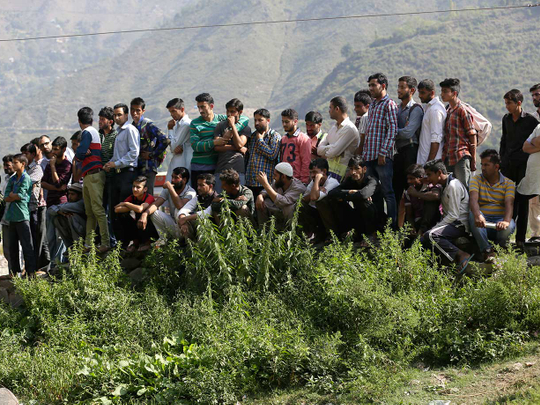
New Delhi: The Uri terror attack that has left 18 Indian soldiers dead deals a lethal blow to the already frayed India-Pakistan ties, with the government coming under intense pressure to give a befitting response to Islamabad.
After the Pathankot army base attack in January that left seven Indian soldiers dead, the Pakistan government had accepted at once that the attack had originated from its territory and would cooperate in the investigation with India. However, this time Pakistan has not even bothered to condemn the attack.
According to strategic affairs expert Vivek Saksena, it was a well-planned terrorist strike by Pakistan on an Indian army base in already troubled Kashmir.
“The attack happened during a change of command at the army base between two regiments — 6 Bihar and 10 Dogra. The attackers knew there would be more soldiers at the base at the time with one regiment leaving and another coming in. What surprises me is why did Pakistan-based terror outfits make a tactical error of attacking India now,” Saksena told Gulf News.
He said the terror attack on Indian soil is a tremendous disadvantage to Pakistan when United Nations General Assembly (UNGA) meeting is just days away.
“Sunday’s attack has internationalised Pakistan’s policy of using terror as a weapon in conducting diplomacy. This will definitely isolate Pakistan on international forums as was decided by India today. This attack strongly supports India’s case that the unrest in Jammu and Kashmir is fuelled and supported by Pakistan,” he added.
India’s options to hit back at Pakistan appear limited, as they carry the risk of escalation. India held back from military retaliation when a Pakistan-based group killed 166 people in a 2008 rampage through Mumbai for fear of igniting a broader conflict and opted instead for a diplomatic offensive to isolate Islamabad.
An attack on another Indian base near the border in January also drew a measured response, but the death toll was lower than in Sunday’s raid.
The concern is that Modi’s government has several times signalled a lower threshold for retaliating against attacks from Pakistan than the previous Congress government, which adopted a policy of “strategic restraint”.
Among the military options that India could consider are artillery strikes on Pakistani army positions it alleges are used for helping militants cross over into its part of Kashmir, military experts say. But that would imperil a 2003 ceasefire along the frontier, although it has frayed in recent years.
A second option on the table would be sending special forces inside Pakistan to attack guerrilla training camps, but that was a high-risk gamble that could easily go wrong, they said.
In Kashmir, as many as 82 people have been killed and thousands others injured in clashes with Indian security forces since July eight when Hizbul Mujahideen militant Burhan Wani was killed in an encounter with security forces.
The Indian government believes that the Uri attack was meticulously planned and executed by Pakistan’s military and intelligence agencies, and its subsidiary terror group, Jaish-e-Mohammad.
According to former foreign secretary and strategic affairs expert Kanwal Sibal, Pakistan has raised the attacks to exploit the situation in Kashmir internationally.
“These attacks have the backing of elements from Pakistan. There is a clear collusion between the government and extremist organisations who have been threatening such attacks,” Sibal said.
Saksena has called for a robust response including military action against Pakistan.
“A strong military action against Pakistan is the need of the hour. We don’t have to make incursions inside Pakistan but we do need to hit specific targets terror camps in Pakistan from our side,” he said.
Experts believe the immediate impact of the Uri attack would be felt on three events — this week’s UNGA session, November’s South Asian Association for Regional Conference (Saarc) meeting and the Heart of Asia conference in December.
India has not yet confirmed if Modi will travel to Pakistan for Saarc summit.
— with inputs from agencies












